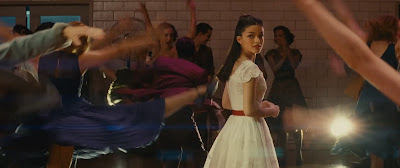or
"Keep Looking for Better"
Why re-make it you ask? The original's a classic.
Yes, a flawed classic that we've become blind to. Robert Wise's 1961 version is beautiful to look at, technically stunning, the dancing is amazing, the music is always good, and Natalie Wood's gorgeous. And Rita Moreno. And Rita Moreno.
But, everybody's too old. Too clean. It feels like play-acting (certainly play-fighting). The Sharks are, for the most part, white guys in tan make-up, as is Russian Natalie Wood's Maria. And no one believes Richard Beymer for a second. Handsome guy, sure. But not for a second. Then, the story-line has always had issues, particularly in its hysterical third act. It did on stage, and even trying to correct it in the movie didn't work.
So, yeah, it needed to be done. And Steven Spielberg (who loved the original) has been wanting to re-make West Side Story since he was sixteen. Sometimes, when you hear a factoid like that, it's a case of being careful what you wish for. A Spielberg version of it would (one would think) at least be an interesting amalgamation of his youthful ideals with his more mature film-making stance of late, the "Gee-Whiz" Kid meets the Craftsman.*
So, how is it? Glorious. And calculated. If you're worried about the emotional "chill factor," the story and the music and the songs still punch you in the heart in the same way when you were an impressionable teenager and would cry over the punctuation of a love note (not enough "!!"'s) or the tragedy of "Romeo and Juliet" (do we really have to explain the piece's origins?). But, it's a different, less vacant world than the one of the '61 version. People look out the window and look at you crazy if you're singing by yourself in the middle of an alley-way. It's a cluttered, messier world and people talk over each other and speak Spanish in emotional dudgeon before being scolded to "speak English!"
It's messier and transitioning. New York's inner city looks like a war zone (It is). Gentrification is going on with blocks being demolished for an in-coming "Lincoln Center." The film starts with an overhead shot of rubble—including (grim foreshadowing smile here) fallen fire-escapes. Then, a Jet pops through a roof-door and the gang starts skipping down the street (not in Jerome Robbins-tight choreography) carrying paint cans. Kicking over a "Man Working" sign, it's apparent they're on a mission, but first they have to leave a slum area in decay to a busy slum area where the people haven't given up yet.
It's smart, less random, and in its own way, sets the precedent for the whole strutting-dancing-fighting correlation that needs to be crossed for "West Side Story" to work. It ends up in a brawl, but no one is high-kicking each other, the punches crunch, one kid gets a nail through an ear-lobe, and there is blood.**
The point is made. This is going to be a tougher "West Side Story" with resentments about things other than turf. At one point, Jets leader Riff (a very good, very weasly Mike Faist) says "Ya know, I wake up to everything I know being sold or wrecked or being taken over by people I don't like" (just in case anybody accuses the movie of not being "relevant") and they're pegged by a New York city cop (Corey Stoll) as being just "slum clearance."
The point is made. This is going to be a tougher "West Side Story" with resentments about things other than turf. At one point, Jets leader Riff (a very good, very weasly Mike Faist) says "Ya know, I wake up to everything I know being sold or wrecked or being taken over by people I don't like" (just in case anybody accuses the movie of not being "relevant") and they're pegged by a New York city cop (Corey Stoll) as being just "slum clearance."
That's the milieu; how are the leads? Reviews I've scanned have problems with both of them, but I think that's wrong. For me, the biggest problem of "West Side Story" was always Tony. You're not sure what his motivation is, other than not to be part of the gang—while being part of the gang. Spielberg and screenwriter Tony Kushner have beefed up the character by giving him additional back-story. Here, Tony is just trying to stay straight: he's been in prison for a year for nearly killing a kid in a past rumble, sort of like John Wayne's Sean Thornton in The Quiet Man—he's haunted by his past actions—and now, he's out on probation, keeping his nose-clean, and working for Valentina (Rita Morena) running Doc's drug store in the old neighborhood. Tony is played here by Ansel Elgort, who's done great work in The Fault in Our Stars and Baby Driver. Elgort can dance, although he doesn't do much of it here, and he has a fine singing voice and isn't shy about hitting the high notes—if I have a complaint about him it's that he seems to be concentrating on the technical side of the singing rather than the acting. But, his Tony is interesting, the guy everybody looks up to (because he's a head taller than everybody) and he only gets MORE interesting once he meets Maria at the dance.At first—the way Spielberg stages it—she's just someone he sees out of the corner of his eye dancing with another guy, enjoying herself (it's her first dance of the night). Then, he walks the outside of the dance floor, stalking, riveted, and it's almost like that attention is what makes Maria notice him. And from that moment on, he's like Brando's Terry Malloy in On the Waterfront—completely gob-smacked, struck stupid by "the thunderbolt" to the point where he'll do anything—anything—for her. And that previous internal conflict just goes away. "All my life, it's like I'm always just about to fall off the edge of the
world's tallest building. I stopped falling the second I saw you." So, she's gotta be something special.
And Rachel Zegler is. There's something preternaturally attractive about her and not in any traditional way. Her eyes are Disney Princess-huge—of COURSE, they've cast her in the live-action Snow White—sunk deep in her skull and they cut across her entire face. She's doll-like, unnatural, but in the way that sinks into the alligator cortex, turns into goo, and makes you want to buy a puppy. And Maria, the character, is a tough sell, with fast emotional transitions and, if done wrong, can seem like the architect of such chaos that one has no sympathy for her, not even at the end. Some wickedly tough songs, too. Fortunately, Zegler is up to the task, and Kushner has given her far more spine than previous versions. You want these kids to work it out and get out of this dump.Spielberg takes advantage of every moment—and sometimes just beats of music—to tell his story. There is sure to be some grousing about musical choices and positionings, particularly how the song "Cool" is used—it's moved in transitions from stage to screen to screen, and here it's Tony's number (which, given his role as thwarted peacemaker, works)—and there is one song that I was horrified when it started to come up in the position that it did, but it gives a needed distraction after the big rumble, and raises emotional goal-posts setting up a particularly savage transition for Maria's character to make.
And some may disagree how the work's most famous piece, "Somewhere," is used—and who it's given to—but the choice is an apt one, making its meaning more ethereal and more universal. Emotionally it feels right. And the big show-pieces are wonders. The show-stopper is always "America" ("I like the island Manhattan/Smoke on your pipe/and put THAT in") and Spielberg opens it up in keeping with maintaining as much location work as possible. I've made no mention of David Alvarez as Bernardo, the boxing leader of The Sharks or his girl Anita, who is played by Ariana DeBose, and that oversight may be criminal. The two are meant to be more flashy than Maria and Tony and they are the life of the party, all flash and dash, smirk and flirt. Their spontaneity can't be contained, so instead of staging the number on a limited rooftop, it moves from back-alleys to city-streets, whirling and sashaying and running at full gallop until not only the show stops but New York traffic as well. The exuberance is contagious, but freer and feels more risky, more dangerous, more alive.
Why re-make it, you ask? (I dunno. Why remake "Romeo and Juliet?") Because with new interpretations come improvements—or not. It's the chance one takes with producing art. They're not going to stop re-staging it in theaters, nor should they. But, if one must cling to the original, there's always what author James M. Cain said when an associate (John Leonard) criticized a film-version of a novel of his: "They haven't done anything to my books" (pointing to his study) "They're still there on the shelf. They paid me and that's the end of it. They're fine." The original is still there—I have it on DVD—and naysayers can watch it anytime they want. I prefer this version, and I'll prefer it...until a better version comes along.
* Robert Wise, when he made West Side Story, had been making films for 17 years. Spielberg has been making them for 47 years. Hmm.
** Later, Spielberg will have a fight where he borrows a few set-ups from a brawl in A Clockwork Orange. He's not kidding around.





























.jpg)




